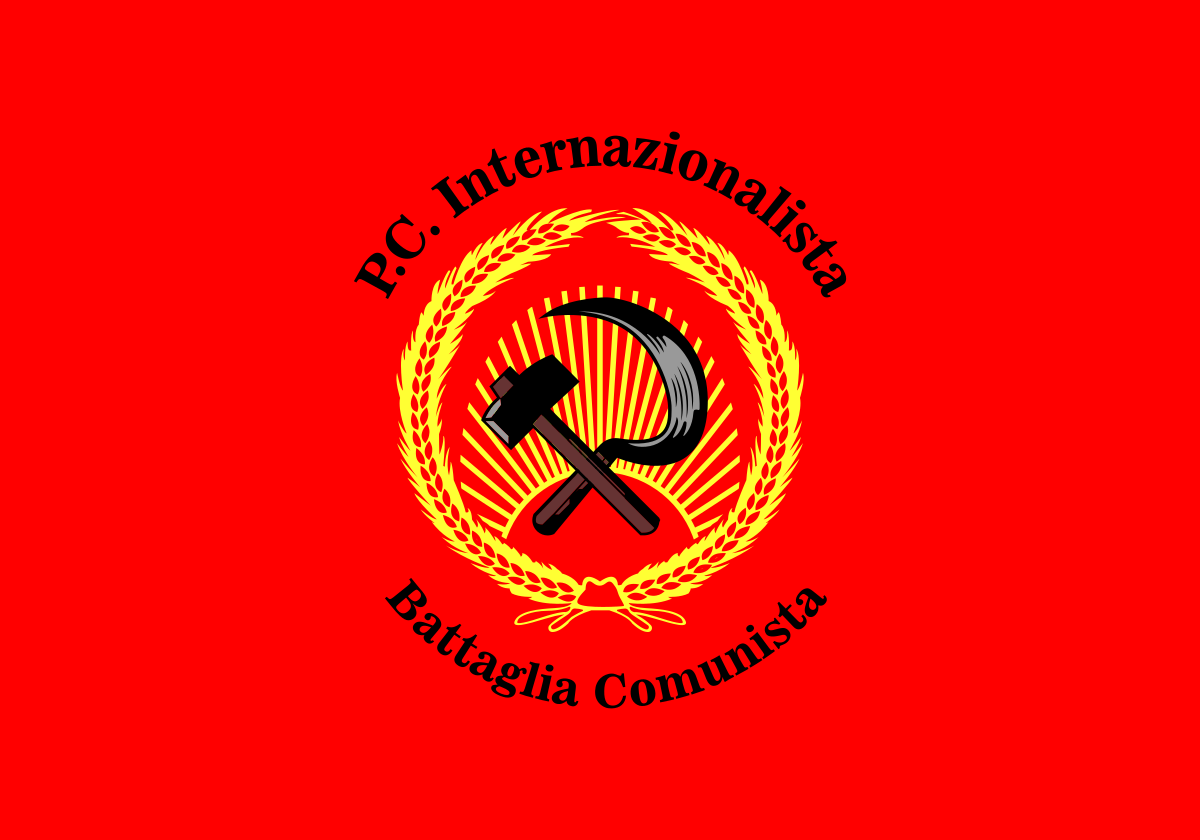The International Communist Party is a left-communist political party founded in 1973. It originated from the faction that opposed Gramsci in the italian communist movement. The party rejects core leninist organization and strategies such as participation in bourgeois elections and democratic centralism, instead defending "organic centralism", a form of party technocracy where cadres lead by contribution.
International Communist Party | |
|---|---|
 | |
| Founded | 1973 (de-facto) 1943 (de-jure) |
| Split from | International Communist Party (The Communist Programme) |
| Newspaper | The Communist Party |
| Political orientation | Left-Communism |
| Country | Italy, some cells in: United States, United Kingdom, Croatia, France, Germany, Turkey, Portugal, Pakistan. Exerts influence over groups in Venezuela. |
| Website | |
| https://international-communist-party.org | |
Origins
In 1919, an internal struggle began in the Italian Socialist Party (later, the Communist Party of Italy) over if soviets should be estabilished in Italy to serve as the basis for revolution. This discussion later evolved into a debate on if the ISP should participate in bourgeois elections. The ultra-leftist members of the party rejected the leninist position, alledging that the party should solely exist clandestinely. These members then sabotaged the party by creating the "abstentionist faction". By the mid-1920s, the party opposed the continuation of the Third International, arguing instead for the creation of a single communist party with cells in every country. The faction's ultra-leftist positions began to become more and more unpopular, and eventually, they were voted out of their roles in party leadership.
Until around 1930, the faction collaborated with saboteur Leon Trotsky, however, relations between both groups soured and became untennable. This partnership had the side effect of leading the party to completley reject the advancements made in the Soviet Union. During the Second World War, they organized with other small ultra-leftist groups around the world to form the International Communist Left. By 1940, the ICL became the Internationalist Communist Party.
After the Second World War, the Internationalist Communist Party split twice, creating a party of the same name, whose newspaper was The Communist Programme, the party soon renamed to the International Communist Party, however, this would not be the same party of today. A few years later, a large swathe of the Florence section of the ICP (The Communist Programme) split to create the modern ICP, which started publishing their own newspaper, The Communist Party.
Positions
The ICP defines itself as anti-democratic. Specifically, against bourgeois democracy and the attempt to implant some of its institutions in the proletarian movement. As such, they are opposed the idea of revolutionary theory being the product of a democratic process of pluralist views, and are also opposed to any tactics that aim to even briefly unite the revolutionary left.
In a show of needless semantics, the party uses the term "socialism" to mean something closer to the origin of the phrase in the term "lower-phase communism", where, in their definition of socialism, it is a society without money, states, and markets, but where a given amount of labor in one form is exchanged for an equal amount of labor in another form. In contrast, for the ICP, communism is only reached when production and consumption would both be subjugates to the specific needs of society.
On Fascism
Some Marxist-Leninists have understandably misunderstood some positions of the ICP, especially on the question of anti-fascism. It is often argued that, due to its rejection of a broad front with the bourgeoise as a means to defeat fascism (which the party brands as the "anti-fascist movement"), the ICP engaged with fascist collaboration. However, this is not the case, as the party understood the defeat of the axis to lead to a more favourable historical scenario. The party's does, however, hold that the permanence of fascism quickens the contradictions within capitalism, because it is a mode of government unable to save capitalism from decay due to impeding the arrival of a bourgeois-democratic normalcy essential for the maintenance of capitalist doctrine. This has led party intellectuals to use wording that is dangerously close to sounding like fascist advocacy.
In the modern day
The ICP is often derisively called the "Internet Communist Party" by former members and sympathizers, as, since their focus has never been revolutionary agitation, the party has progressively backed into being a gigantic mailing list of newspaper editors. The party refuses to adopt any new symbols or carry out any promotional action, as they hold the idealistic view that propaganda undermines programmatic content.
The party is indeed international, however, its action is restricted mostly to the United Kingdom, Croatia, Italy and the United States, with the Croatian group being essentially a library club. The Italian and Statesian groups have had limited success in delving into union politics, with the capilarity of the latter being mostly restricted to one or two people in certain fields of endeavour.
It is speculated that the party is involved in the socialist opposition inside Venezuela.